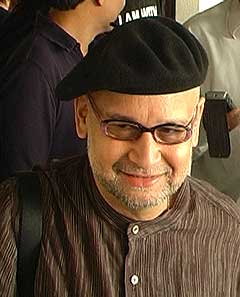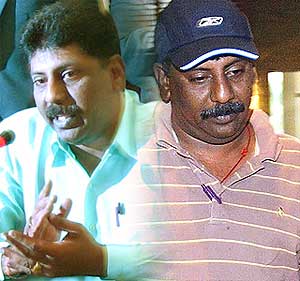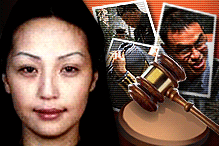COMMENT Raja Petra Kamarudin's interview by TV3 on Wednesday night is undoubtedly a piece of political propaganda aimed at cleansing Prime Minister Najib Razak's taint with the Altantuya Shariibuu murder case ahead of tomorrow's Sarawak elections.
 Raja Petra's (
right
) interview was centred on an affidavit he signed on June 18, 2008, in which he claimed he was reliably informed by his informer that Najib's wife Rosmah Mansor was at the scene of the crime, witnessing the blasting of Altantuya's body.
Raja Petra's (
right
) interview was centred on an affidavit he signed on June 18, 2008, in which he claimed he was reliably informed by his informer that Najib's wife Rosmah Mansor was at the scene of the crime, witnessing the blasting of Altantuya's body.
Raja Petra now claims that he no longer believes what he believed then.
Let us be very clear on this issue at the very outset. The veracity or otherwise of that affidavit as well as whatever belief or disbelief Raja Petra may have over the Altantuya case does not add or subtract one bit to the dark clouds that have persisted in hounding Najib over this murder case.
Failure of institutions
Such negative perceptions of Najib do not arise from so-and-so says this or that. Rather, they have accumulated over Najib's own failure to conduct himself appropriately as well as the overly protective shield provided by our law-enforcing institutions to keep Najib out of bounds to due legal process - to the point of dereliction of duty, bordering on criminal collusion.
It is these flagrant institutional failures as well Najib's clumsily evasive conduct that has deepened public suspicion of his involvement.
These instances are too many to enumerate, but we will mention a few to refresh the public's memory.
Starting with the police, there is no reason whatsoever why they should have left Najib and his aide-de-camp Musa Safri out of the loop of its investigation, when all the three accused were closely linked to Najib and it was Musa who instructed the first two accused to tackle Altantuya.
Police failure was even more glaring when it did not act on private investigator P Balasubramaniam's all three affidavits and video interview by three senior lawyers.
 The information provided by Bala in these documents not only incriminated Najib (in the first affidavit), but also accused Rosmah and Najib's brother Nazim of forcing Bala (
left
) and his family to flee the country with bribe and threats (recorded in video interview and submitted via the third affidavit).
The information provided by Bala in these documents not only incriminated Najib (in the first affidavit), but also accused Rosmah and Najib's brother Nazim of forcing Bala (
left
) and his family to flee the country with bribe and threats (recorded in video interview and submitted via the third affidavit).
The third affidavit was in reply to Malaysian Anti-Corruption Commission's (MACC) written questions, and submitted in July 2010. There has been no response from MACC, despite written reminders by Bala's lawyer.
What possible reason is there for the police and MACC to remain silent over these serious accusations, backed by factual details, against the prime minister and his family? If Najib and family are innocent, wouldn't these law enforcing bodies have sprung to action in the first instance to clear the PM and family of such a horrible stigma?
Bizarre irregularities
The scenario in the court was even more bizarre. Revealing and critical evidence exposed in court was quickly smothered, instead of being pursued in the cause of truth and justice.
The extraordinary part is that the attempt to bury these new evidence was not engendered by one or two parties but by all the three parties acting in concert - prosecutor, defence and judge.
These included the erasure of the immigration record of Altantuya and her Mongolian companions, and an alleged photograph of Najib, (
right
) Altantuya and the third accused having a meal in a restaurant. The former evidence would have yielded important lead to some high power involvement in the case, while the latter would have nailed Najib (if proven), who had repeatedly sworn that he had never known nor met Altantuya.
This grotesque phenomenon of confluence of interest of all the judicial players to suppress new evidence can have only one explanation - Najib must be kept out of this case.
That justice might not have been fully served through the sentencing of the first two accused to death should be obvious, when the court never bothered to probe into the motive of executing the girl - and in such cruel fashion. It is not difficult to fathom why motive of murder was never mentioned in court. The simple answer is: there is none.
The two convicted killers, who were bodyguards to Najib, and trained to execute order rigidly without question, had no motive on their own to kill someone they had never met.
And since the third accused, who was accused of instigating the killing, was set free due to lack of evidence, then the remaining question must be: who ordered the killing?
Is it conceivable that the bodyguards had killed without order and without motive? Isn't it logical to deduce that the mastermind and real culprit may still be lurching somewhere beyond the realm of the court?
It is clear that major questions and swirling doubts over the handling of the case are still unresolved.
 Until these are satisfactorily answered through a just court and an honourable police force, which can only be brought into existence through a complete change of political leadership, it is naive to hope for the return of justice to Altantuya's family and the nation. And until such time, Premier Najib cannot expect to be free from the haunting of Altantuya's murder.
Until these are satisfactorily answered through a just court and an honourable police force, which can only be brought into existence through a complete change of political leadership, it is naive to hope for the return of justice to Altantuya's family and the nation. And until such time, Premier Najib cannot expect to be free from the haunting of Altantuya's murder.
KIM QUEK is a retired accountant and author of the banned book ‘ The March to Putrajaya '.

